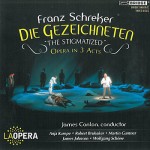Column Name
Title
Subhead
Franz Schreker: Die Gezeichneten. Los Angeles Opera, James Conlon, conductor. (Bridge 9400A/C)
Body
Almost 100 years after its creation, Franz Schreker’s opera Die Gezeichneten (“The Stigmatized”) had its United States premiere, in 2010, thanks to conductor James Conlon, director Ian Judge, and the Los Angeles Opera. Conlon (B.M. ’72, orchestral conducting) has been a persuasive advocate for neglected music of composers whose music was banned by the Nazi regime as well as those who perished in the concentration camps. This recording is the latest installment in the Los Angeles Opera’s Recovered Voices series, which presents works by some of these composers—primarily Jewish—who were silenced. Die Gezeichneten was recorded live, and engineer Fred Vogler has done impressive work capturing the soloists and massive orchestra at the Dorothy Chandler Pavilion in Los Angeles.
After his first opera, Flammen (“Flames”), from 1902, Schreker (1878-1934) wrote nine others, and at the height of his career was among the ranks of the most prominent musicians, artists, and writers of fin-de-siècle Vienna. Christopher Hailey writes in his liner notes that “Schreker was every bit the contemporary of Sigmund Freud, Gustav Klimt, and Arthur Schnitzler. Like them he explored the dark recesses of the psyche and the labyrinthine complexities of the human soul, but he did so with an infinitely nuanced musical language that took as its starting point the rich resources of the orchestra. If Arnold Schoenberg emancipated dissonance, Schreker, like Debussy, emancipated timbre.”
In addition to composing, Schreker founded the Vienna Philharmonic Choir (in 1907), which among its premieres counted Schoenberg’s Friede auf erden and Gurrelieder. And after the success of his 1918 opera Der Schatzgräber (“The Treasure Hunter”), Schreker became the director of Germany’s most prestigious conservatory, the Berlin Musikhochschule, from 1920 until 1932, when political pressure forced him to resign. One year later, he also lost his position teaching music composition at the Prussian Academy of the Arts, and he died in March 1934, three months after suffering a stroke.
Die Gezeichneten’s odd story (Schreker also wrote the libretto) is set in 16th-century Genoa with a love triangle at its core. A hunchback named Alviano has created an island paradise, Elysium, which he never visits, believing he is too ugly for its attractive surroundings. In his absence, the island has been taken over by the dissolute Count Tamare and his debauched, aristocratic friends, who have been abducting young Genoese women for violent orgies in a grotto. Meanwhile, Alviano discovers Carlotta, an artist and the daughter of a Genoan nobleman, who wants to paint his portrait to show his inner beauty; Alviano falls in love with her. Tamare also desires Carlotta, and, in the final act, which takes place on the island, the Genoese townspeople, led by Alviano, find Carlotta and other women in the grotto. Believing that Tamare has raped her, Alviano kills the count. Barely conscious after her ordeal, Carlotta rejects Alviano. As she dies, she murmurs Tamare’s name, leaving Alviano to wander through the crowd in stunned disbelief.
Starting with the marvelously lush overture, Conlon gives a commanding account of Schreker’s vast chromatic landscape. A sterling example of the composer’s melodic gifts is evident at the close of Act I, when Carlotta, sung by soprano Anja Kampe, describes her artistic talents to Alviano and invites him into her small studio to “paint his soul.” Kampe’s voice soars luxuriously over an orchestra that explodes with late-Romantic rapture, reaching a climax when she sings, “I still lack the ecstatic eye, in which all beauty is reflected.” As Alviano, tenor Robert Brubaker is superb, giving the tragic role warmth and humanity, and Martin Gantner, with his robust baritone, gives the Count a slightly sleazy, lubricious edge.
The rest of the principals—James Johnson as Duke Adorno and Wolfang Schöne as Ludovico—are memorable, too, and some two dozen singers complete the cast as other citizens of Genoa. The production includes several other Juilliard alumni: bass-baritone Matthew Burns (’02, opera studies), mezzo-soprano Ronnita Nicole Miller (Graduate Diploma ’06, voice; Artist Diploma ’07, opera studies), and Los Angeles Opera concertmaster Stuart Canin (’49, violin).
Throughout the almost three-hour production, Conlon leads the orchestra with cool authority, choosing flowing tempos that show off the composer’s long phrases to maximum advantage as well as his compendium of imaginative colors.
For listeners curious to hear more, Conlon has also recorded some of Schreker’s orchestral works (for EMI) with the Gürzenich Orchester Köln, including Prelude to a Drama, an expanded version of the Overture to Die Gezeichneten. Conlon also conducts on two DVDs in the Recovered Voices series: the first couples Alexander Zemlinsky’s Der Zwerg (“The Dwarf”) with Viktor Ullmann’s Der zerbrochene Krug (“The Broken Jug”), and on the second is Walter Braunfels’s Die Vögel (“The Birds”). Both are on the Arthaus label.





